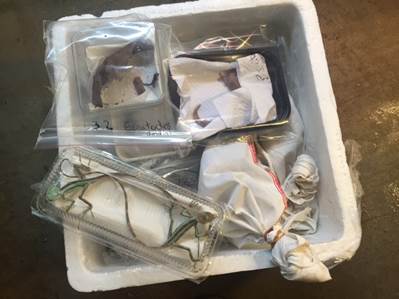Kids & Family
Check Out the New Iguanas at the Oakland Zoo
Need an excuse to go to the zoo, Rockridge? Here's what's new!

Photo: Two iguanas now at the Oakland Zoo were found in this shipment of prohibited wildlife. Photo credit: Oakland Zoo
--
OAKLAND, CA - A pair of exotic iguanas that were illegally smuggled into the U.S. are now on exhibit at the Oakland Zoo, zoo officials say.
The two casque-headed iguanas recently made their debut in front of the public and will be on permanent display at the zoo's Reptile and Amphibian Discovery Room.
Find out what's happening in Rockridgewith free, real-time updates from Patch.
The lizards, which are native to Mexico and Central America, are adjusting well to their new home at the zoo. They arrived in dire condition when a government wildlife inspector delivered them to the zoo less than a year ago, according to zoo officials.
The iguanas were part of a larger shipment consisting of 60 illegally trafficked wild animals smuggled into the U.S. The animals, mostly baby lizards and turtles, were severely dehydrated, cold and parasite ridden when they were intercepted and confiscated by the U.S. Fish and Wildlife Service, zoo officials said.
Find out what's happening in Rockridgewith free, real-time updates from Patch.
Wildlife traffickers had transported the animals in over-crowded and substandard shipping containers. Some of the animals died during the overseas journey from exposure to parasites, but most survived. The surviving animals have since been transferred to different zoos and are doing well.
In such situations, animals that have been illegally smuggled cannot be returned to the wild, according to zoo officials. "Animals who are smuggled into the country have only about a 50 percent chance of surviving the trip. When purchasing pet reptiles, people should always research and look at their local reptile rescue centers or at least try to find animals who were bred in captivity to avoid supporting wildlife trafficking," the zoo's Zoological Manager Margaret Rousser said in a statement.
The illegal wildlife trade, which includes the harvest and trade of plants, animals, and parts of products derived from them, is estimated to be a multimillion-dollar business.
Illegal wildlife trade is harmful to wild populations of plants and animals and could push already endangered species to extinction, zoo officials said.
--Bay City News
Get more local news delivered straight to your inbox. Sign up for free Patch newsletters and alerts.